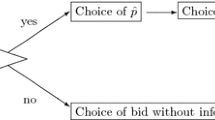Abstract
We run an experiment where 97 subjects could retrieve records of completed past auctions before placing their bids in current one-bid, two-bid, and auction-selection games. Each subject was asked to participate in 3 current auctions; but could retrieve up to 60 records of completed (past) auctions. The results reveal a positive relation between the payoffs earned by the subjects and their history-inspection effort. Subjects act as if responding to the average bidding-ratios of the winners in the samples that they have retrieved. They apply intuitive signal-dependent stopping rules like “sample until observing a winner-value close to my won” or “find a close winner-value and try one more history” when sampling the databases. History-inspection directs bidders with relatively high private-valuations to moderate bidding which increases their realized payoffs. (JEL C9 D4 D8)
Similar content being viewed by others
References
Bandura, A., (1986). Social Foundations of Thought and Action – A Social Cognitive Theory.Prentice Hall.
Battigalli, P. & Siniscalchi, M. (2003). “Rationalizable Bidding in First-Price Auctions,” Games and Economic Behavior, 45(1), 38–72.
Baye, M. R., & Morgan, J. (2001). “Information Gatekeepers on the Internet and the Competitiveness of Homogeneous Product Markets,” American Economic Review, 91(3), 454–474.
Braunstein, Y. M., & Schotter, A. (1981). “Economic Search: An Experimental Study,” Economic Inquiry, 19, 1–25.
Birnbaum, M. H. (2000). Psychological Experiments on the Internet. San Diego. Ca. Academic Press.
Braunstein, Y. M., & Schotter, A. (1982). “Labor Market Search: An Experimental Study,” Economic Inquiry, 20, 133–144.
Cox, J. C., Smith, V. L., & Walker J. M. (1988). “Theory and Individual Behavior in First-price Auctions,” Journal of Risk and Uncertainty, 1, 61–99.
Duffy, J., & Feltovich, N. (1999). “Does Observation of Others Affect Learning in Strategic Environments? An Experimental Study,” International Journal of Game Theory, 1, 131–152.
Gilboa, I., & Schmeidler, D. (1995). “Case-Based Decision Theory,” Quarterly Journal of Economics, 110, 605–639.
Harrison, W. G, & List, J. A. (2004). “Field Experiments,” Journal of Economic Literature, 42, 1009–1055.
Heckman, J. (1978). “Dummy Endogenous Variables in a Simultaneous Equation System,” Econometrica, 46, 931–961.
Ivanova-Stenzel R., & Sonsino, D. (2004). “Comparative Study of One-bid vs Two-bid auctions,” Journal of Economic Behavior and Organization, 54, 561–583.
List, A. J., & Lucking-Reiley, D. (2000). “Demand Reduction in Multiunit Auctions: Evidence from a Sportscard Field Experiment,” American Economic Review, 90, 961–972.
Kagel, J., & Roth, A. (1992). “Theory and Misbehavior in First-Price Auctions: Comment,” American Economic Review, 82, 1374–8.
Kagel, J., & Levin, D. (2001). “Behavior in Multi-Unit Demand Auctions: Experiments with Uniform Price and Dynamic Vickery Auctions, ” Econometrica, 69, 413–454.
Merlo, A., & Schotter, A. (2003). “Learning by not Doing: An Experimental Investigation of Observational Learning,” Games and Economic Behavior, 42(1), 116–136.
Monderer, D., & Tennenholtz, D. (2004). “K-Price Auctions: Revenue Inequalities, Utility Equivalence and Competition in Auction Design,” Economic Theory, 24, 255–270.
Monderer, D., & Tennenholtz, D. (1999). “Distributed Games,” Games and Economic Behavior, 28, 55–72.
Ockenfels, A., & Selten, R. (2005). “Impulse Balance Equilibrium and Feedback in First Price Auctions,” Games and Economic Behavior, 51, 155–170.
Siegel, S., & Castellan, N. J. (1988). Non-parametric Statistics for the behavioral Sciences. Mac-Graw-Hill.
Wellman, P. W., Walsh, W. E., Wurman, P. R., & MacKie-Mason, J. K. (2001). “Auctions Protocols for Decentralized Scheduling,” Games and Economic Behavior, 2001, 35, 1/2, 271–304.
Author information
Authors and Affiliations
Corresponding author
Additional information
JEL Classification C93, D44, D83
Electronic supplementary material
Rights and permissions
About this article
Cite this article
Sonsino, D., Ivanova-Stenzel, R. Experimental internet auctions with random information retrieval. Exp Econ 9, 323–341 (2006). https://doi.org/10.1007/s10683-006-7050-y
Received:
Revised:
Accepted:
Issue Date:
DOI: https://doi.org/10.1007/s10683-006-7050-y




